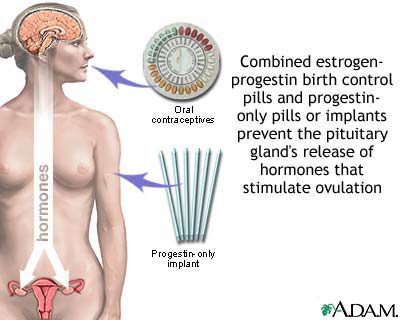


| Skip navigation | ||
 |
 |  |
|
|
||
Hormone-based contraceptives

The pill works in several ways to prevent pregnancy. The pill suppresses ovulation so that an egg is not released from the ovaries, and changes the cervical mucus, causing it to become thicker and making it more difficult for sperm to swim into the womb. The pill also does not allow the lining of the womb to develop enough to receive and nurture a fertilized egg.
This method of birth control offers no protection against sexually-transmitted diseases.
Update Date: 9/19/2006 Updated by: Audra Robertson, MD, Department of Obstetrics and Gynecology, Brigham and Women's Hospital, Boston, MA. Review provided by VeriMed Healthcare Network.

| Home | Health Topics | Drugs & Supplements | Encyclopedia | Dictionary | News | Directories | Other Resources | |
| Copyright | Privacy | Accessibility | Quality Guidelines U.S. National Library of Medicine, 8600 Rockville Pike, Bethesda, MD 20894 National Institutes of Health | Department of Health & Human Services |
Page last updated: 02 January 2008 |